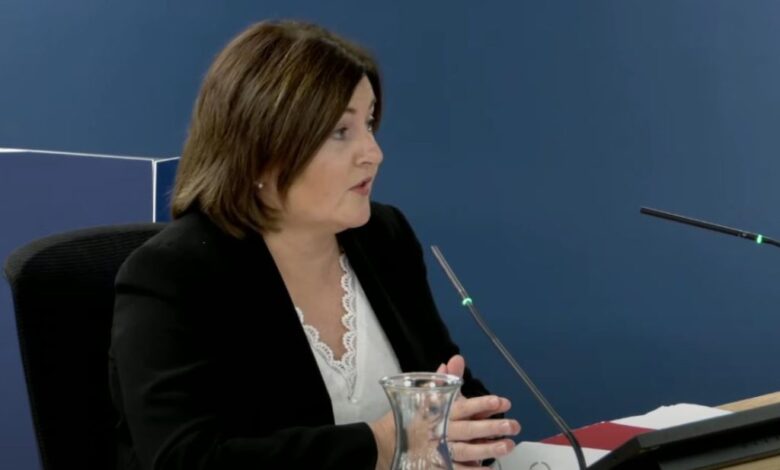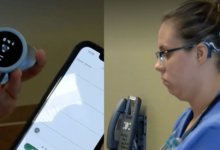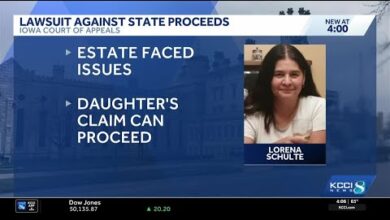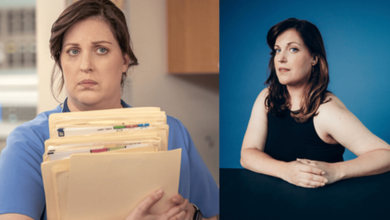Covid required ‘least worst’ decisions, says ex-Northern Ireland CNO

The former chief nursing officer (CNO) of Northern Ireland has said early pandemic decision-making put her and other leaders “between a rock and a hard place” and that the “least worst decision” often had to be made.
Professor Charlotte McArdle, who was CNO during the outbreak, made the comments during an evidence session of Module 3 of the UK Covid-19 Inquiry, which is investigating the impact Covid-19 had on health systems across the four nations.
“It was a very difficult time, and decisions were the least worst option”
Charlotte McArdle
Professor McArdle was succeeded as CNO in Northern Ireland by Maria McIlgorm in March 2021 and now serves as a deputy CNO in England.
She appeared before the inquiry this morning, questioned by counsel to the inquiry Nick Scott, who asked her about key decisions made in the first months of Covid-19, the first case of which was confirmed in Northern Ireland in late-February 2020.
Mr Scott asked the former CNO for her assessment of the impact of workforce shortages on patient care.
In particular, whether Professor McArdle thought the integrated health and social care structure in Northern Ireland, meaning some health staff were redeployed to the independent care sector, worked well.
“For a very sick patient coming into hospital, the beds need to continuously move and circulate in order to be able to admit people, to admit them to ICU, to come out of ICU, to recover, back out into the community,” she said.
“To make that process work… there was recognition that wider resources [were] needed.
“There’s no getting away from the fact that there was limited capacity and a limited amount of staff. But the system working together in that way had a great benefit.”
However, Professor McArdle acknowledged that, well before the pandemic, there were well-documented workforce difficulties in nursing.
The inquiry heard how there was an 11% vacancy rate for registered nurses and midwives in Northern Ireland by the end of 2019.
“That, coupled with the impact of sickness and self isolation, really meant in reality… the nursing workforce would have been closer to 20-25% non-availability of work, so that was very stretching,” said Professor McArdle.
“[The system] didn’t have any spare capacity”
Charlotte McArdle
As with other UK nations, the ratio of critical care nurses to patients was diluted during the first wave of Covid-19 in order to increase this capacity.
The inquiry heard that, on 1 March 2020, there were 88 critical care beds in Northern Ireland, and that a ‘surge plan’ dated 17 April 2020 suggested a need for 140 Covid-19, and 35 non-Covid-19 critical care beds.
Professor McArdle was asked how realistic an ask this was with the nursing workforce available, to which she said it would have been “extremely challenging” and involved reducing the nurse ratio “significantly” and taking additional staff from elsewhere.
“[The system] didn’t have any spare capacity, it was very stretched at the time,” she said.
Mr Scott pressed Professor McArdle on whether it was the right decision, therefore, to allow the redeployment of nursing and other healthcare staff to the independent sector.
The former CNO said it was a “balance of risk”, and that bolstering the social care workforce was necessary: “It’s the way the system works, and I think it was the right thing to do, and I really don’t know how we would have done it differently.”
She later agreed with Mr Scott’s assessment that a “fundamental problem” during the pandemic was a lack of nurses.
Mr Scott then moved on to visiting policies.
On 9 April 2020, all hospital visits were stopped, with no exceptions for end-of-life care in intensive care units, the inquiry heard.
Professor McArdle said there was a “person-centred” approach to visiting restrictions, and said: “I deeply regret that we had to make that decision, but we were in the peak of the first wave.
“We were expanding our capacity for ICU. We had additional ICU beds in most intensive care units, some of which had limited space.
“It wasn’t possible, in a high risk area with aerosol generating procedures and the implications of donning and doffing [PPE], to enable staff to allow visitors in… our staff were fully stretched at that point.
“So for that period of time, during that first wave, we had to further restrict visiting.”
Professor McArdle acknowledged that this decision was also made on the assumption that the height of the pandemic would last “a few weeks”.
“I felt, at the time, we were between a rock and hard place, and there was nowhere else to go with this,” she said.
“It wasn’t a decision that I really wanted to make, or would want anybody’s family to have experienced, but it was a balance of risk between protecting patient, staff and public, and I really do understand the implications of making that decision.
“I’ve had very personal experience and not being able to visit my own mother when she died in hospital. So I do understand.”
The inquiry counsel further asked Professor McArdle if she had received complaints from families, after adjustments to guidance to nurse leaders on 11 May 2020 which said only in “extreme” cases should visits be denied.
Professor McArdle said she was “assured” by directors of nursing and staff that patients’ families were being accommodated, and that solutions were largely found to complaints from families.
Asked if there was anything she thought could have been done differently, Professor McArdle said: “I think that we did our best in the circumstances.
“We tried to be flexible with the iterations of the guidance as new evidence became available, as we became aware of particular difficulties, and I’m not sure that I could have personally done any more for my team.
“It was a very difficult time, and decisions were the least worst option.”
To read what else Professor McArdle and the other UK CNOs told the Covid inquiry, see Nursing Times’ live coverage.
More from the UK Covid-19 Inquiry







